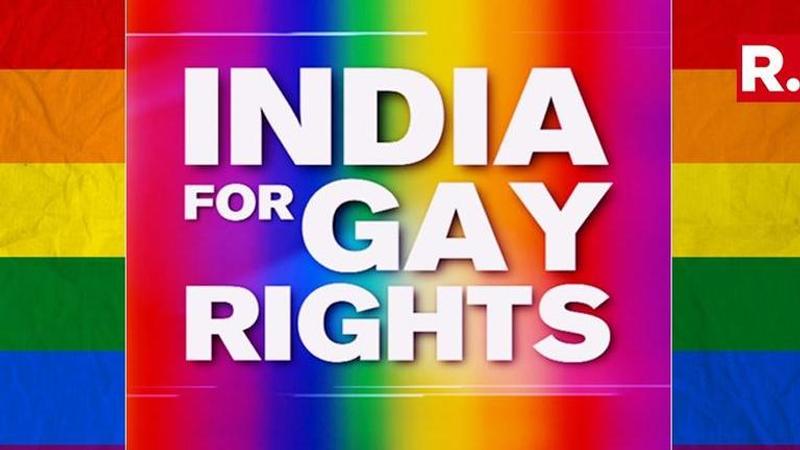Published 12:45 IST, September 6th 2018
India Rejects 377: Gay sex not a crime in India anymore after Supreme Court decriminalises homosexuality
Section 377 verdict: In a landmark coming-of-age moment for gay rights in a progressive 21st century India, a 5-judge Constitution bench of the Supreme Court on Thursday delivered a unanimous verdict striking down sections of the colonial-era 156-year-old Section 377 of the Indian Penal Code which criminalises homosexuality.

In a landmark coming-of-age moment for gay rights in a progressive 21st century India, a 5-judge Constitution bench of the Supreme Court on Thursday delivered a unanimous verdict striking down sections of the colonial-era 158-year-old Section 377 of the Indian Penal Code which criminalises homosexuality.
Following verdicts by four judges, with Chief Justice of India Dipak Misra speaking on behalf of Justice Khanwilkar, the 5-judge bench unanimously held Section 377 (to the extent of sexual acts between consenting adults) as unconstitutional.
While pronouncing his verdict, CJI Dipak Misra said that sustenance of identity is one’s right and that “protecting one’s identity and one’s privacy are the important pillars of the Constitution.” While asserting that no one can escape their individuality, CJI Misra said:
“I am what I am, So take me as I am, No one can escape from their individuality. Shakespeare said a rose by any other name would smell just as sweet. The name is a convenient concept for identification. Sans identity, the name only remains a term.”
After CJI Dipak Misra concluded pronouncing his verdict, Justice Nariman asked the government to "take all measures to give wide publicity to this judgment. Government ought to remove the stigma associated with homosexuality. Through mediums of print, electronic media etc, government should spread the word."
He also said that "such groups are entitled to protection, ought to be treated as human beings without any discrimination."
Following the conclusion of verdict by Justice Nariman, Justice Chandrachud pronounced his verdict and said:
"Human instinct to love was constrained by the physical manifestation of their sexuality."
"Our constitution nurtures dissent as a safety valve. It is difficult to correct the past but we can set the course for the future. Discrimination is being faced by the LGBTQ - have dealt with it exclusively in the judgment and have titled it 'ashes of the gay'," he added.
After Justice Chandrachud's verdict, Justice Indu Malhotra pronounced her verdict, concurring with the other 4 judges. Justice Malhotra said:
"History owes an apology to this community. Members of this community were compelled to live a life of fear. This was due to the ignorance of the majority. They’ve been denied fundamental right under article 14, 15 and 21. LGBTQ persons deserve to live a life unshackled."
The Supreme Court had reserved its verdict on July 17 after a days-long marathon hearing over a batch of petitions against Section 377. During the hearing, the Central Government had left the decision on the matter to the wisdom of the apex court.
The relevant point in the government's affidavit in the case had stated:
"I state and submit that so far as the constitutional validity Section 377 to the extent it applies to "consensual acts of adults in private" is concerned, the Union of India would leave the said question to the wisdom of the Honourable Court."
The 5-judge constitution bench's ruling reverses the 2013 ruling by the Supreme Court that had, in turn, set aside the 2009 order of the Delhi High Court that had decriminalised Section 377. In January 2018, while referring the matter to the constitution bench, the apex court had said:
"Earlier decision of the Supreme Court in 2013 requires to be reconsidered because of the constitutional issues involved and we think it appropriate to send this to a larger bench".
While hearing as many as six petitions and interventions which were filed by the NGO Naz Foundation, 'Voices Against 377' human rights activists and parents of queer children, the constitution bench went on to describe the 2013 judgment criminalising gay sex as a "mess".
What did Section 377 say?
Section 377 of the IPC reads, "Whoever voluntarily has carnal intercourse against the order of nature with any man, woman or animal, shall be punished with imprisonment for life, or with imprisonment of either description for a term which may extend to ten years, and shall also be liable to fine." While the law doesn't explicitly refer to LGBT, the very mention of "against the order of nature" has come to be referred for same-gender sexual relations.
Updated 17:19 IST, September 6th 2018




